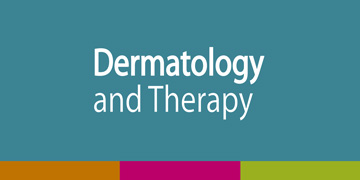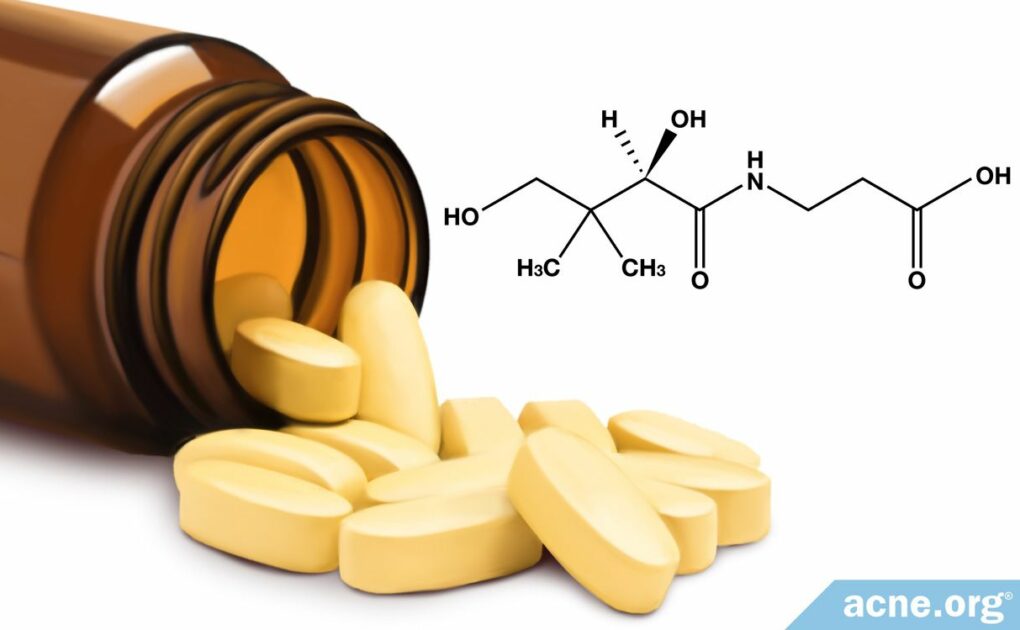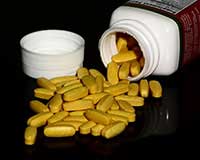What is vitamin B5 and does it help acne?

The Essential Info
We have only one study so far that shows that megadosing on vitamin B5 orally may help reduce acne, but the study was small, and was sponsored by a marketing company, so we will need to see it replicated before we make any calls on whether vitamin B5 works for acne.

The Science
- Summary of B5 hypothesis
- Some encouraging new evidence?
- The Proof Is in the Pudding
- If You’re Vitamin B5-deficient
- The Bottom Line
Dr. Leung’s acne hypothesis
In 1995, the journal Medical Hypotheses printed a hypothesis by Dr. Lit-Hung Leung, a physician from Hong Kong, which attempted to link vitamin B5 (pantothenic acid) deficiency with acne formation.1 Then, in 1997, the Journal of Orthomolecular Medicine printed an article by Dr. Leung on the same topic.2 The hypothesis was just that, a hypothesis – an initial suggested explanation, in this case without any reputable studies to back up the claim. We have almost no evidence supporting the hypothesis, but many companies (Vilantae is perhaps the most well known) market B5 to acne sufferers. This is not to say that anyone is certain that B5 does not help with acne. The truth of the matter is that very little research exists. As you read the summary of Dr. Leung’s hypothesis below, keep in mind that this is essentially guesswork. To make educated conclusions, double-blind, controlled research will be required.
Summary of B5 hypothesis
Vitamin B5 (pantothenic acid) is a component of Coenzyme A. Coenzyme A is necessary for hormone production as well as fatty acid metabolism. During puberty, as hormone production increases, the body chooses to use coenzyme A to produce hormones and neglects fatty acid metabolism. Because the body uses coenzyme A for hormone production instead of fatty acid metabolism, sebum (skin oil) levels rise and acne follows. Supplementing with megadoses of vitamin B5 allows for enough circulating B5 to address both bodily processes, thus curing acne.2
Upon first reading of Dr. Leung’s hypothesis, the reasoning seemed to make common sense. However, I became heavily skeptical when Dr. Leung mentioned a study he performed on this topic using 100 Chinese patients between the ages of 10-30.2 First, there was no control group in the study. Next, participants were given both internal (10g/day) and topical (20% cream 4-6X/day) B5, so the vehicle of administration was not controlled.2 Furthermore, no baseline lesion count was established, nor were lesion count results presented. Improvement was presented in general terms. In short, this study is littered with holes.”
Dan Kern, Acne.org founder
Some encouraging new evidence?
Since Dr. Leung first published his hypothesis, one group of researchers has performed a randomized, double-blind, placebo-controlled study–in other words, the kind of rigorous study we need to see whether the hypothesis holds water. However, despite the quality of the study, we must keep in mind that it was sponsored by a marketing company, which might have influenced the conclusions. The results of the study were published in the journal Dermatology and Therapy in 2014.

In the study, the researchers randomly divided 41 participants with mild-to-moderate acne into two groups:
- Group 1 took four vitamin B5 supplement pills a day, adding up to a daily megadose of 2.2 g, for 12 weeks.
- Group 2 took a placebo for the same amount of time.
After 12 weeks, the researchers assessed the participants’ acne and found that Group 1 had significantly fewer acne lesions than Group 2. Specifically, the total number of acne lesions in the participants who took vitamin B5 megadoses was reduced by 68%. The scientists also reported that the vitamin B5 supplement caused no side effects. However, they noted that the study was short and cautioned that we need more research to determine whether taking vitamin B5 supplements over the long term might be safe and effective against acne.3
Of course, this is still only one study with a relatively small number of participants. We need more studies like this before we can say with any confidence that vitamin B5 really helps with acne.
The Proof Is in the Pudding
I carefully looked through many of your reviews on B5 in the reviews and ratings section of acne.org. No real consensus seems evident. Some people are claiming great results, while others see no improvement. Keep in mind that placebo tends to work (about 30%) in clearing acne. Side effects seem low and tolerable.
If You’re Vitamin B5-deficient
One case in which taking vitamin B5 supplements may be warranted is if you’re deficient in this vitamin. Research suggests that correcting a vitamin B5 deficiency may help reduce stress, which is a good idea in general and might even indirectly help with acne as well.4
Generally speaking, if you’re eating a varied diet that includes vegetables and lean meats, you probably have no reason to worry. Vitamin B5 is found in most vegetables as well as in nuts, legumes (beans and peas), poultry, and even dairy products.
However, if you are concerned that you might have a vitamin B5 deficiency, ask your doctor for a simple vitamin B5 blood test. If the test shows that you do have a deficiency, your doctor will likely recommend a supplement.
The Bottom Line
Before we begin buying and taking megadoses of B5, we’ve got to see more solid evidence backing up the efficacy of such supplementation.
References
- Leung, L. H. Pantothenic acid deficiency as the pathogenesis of acne vulgaris. Med. Hypotheses 44, 490-492 (1995). https://www.ncbi.nlm.nih.gov/pubmed/7476595
- Leung, L. H. A stone that kills two birds: How pantothenic acid unveils the mysteries of acne vulgaris and obesity. J. Orthomol. Med. 12, 99-114 (1997). http://orthomolecular.org/library/jom/1997/articles/1997-v12n02-p099.shtml
- Yang, M., Moclair, B., Hatcher, V., et al. A randomized, double-blind, placebo-controlled study of a novel pantothenic acid-based dietary supplement in subjects with mild to moderate facial acne. Dermatol Ther (Heidelb). 4, 93-101 (2014). https://pubmed.ncbi.nlm.nih.gov/24831048/
- Young, L. M., Pipingas, A., White, D. J., Gauci, S. & Scholey, A. A systematic review and meta-analysis of B vitamin supplementation on depressive symptoms, anxiety, and stress: effects on healthy and ‘at-risk’ individuals. Nutrients. 11, 2232 (2019). https://pubmed.ncbi.nlm.nih.gov/31527485/
Further Reading
- Higdon, J., Drake, V. J. & Mock D. Biotin. Linus Pauling Institute at Oregon State University. August 2008. Linus Pauling Institute Micronutrient Information Center. 9 July 2009. https://lpi.oregonstate.edu/mic/vitamins/biotin
- Higdon, J., Drake, V. J., Plesofsky, N. Pantothenic Acid. Linus Pauling Institute at Oregon State University. April 2008. Linus Pauling Institute Micronutrient Information Center. 9 July 2009. https://lpi.oregonstate.edu/mic/vitamins/pantothenic-acid
- Leung, L. H. Pantothenic acid as a weight-reducing agent: fasting without hunger, weakness and ketosis? Med. Hypotheses 44, 403-405 (1995). https://www.ncbi.nlm.nih.gov/pubmed/8583972
- Zempleni, J., Mock, D. M. Human peripheral blood mononuclear cells: Inhibition of biotin transport by reversible competition with pantothenic acid is quantitatively minor. J. Nutr. Biochem. 10, 427-432 (1999). https://www.ncbi.nlm.nih.gov/pubmed/15539319
- Pantothenic acid – B5. The World’s Healthiest Foods. The George Mateljan Foundation. 13 August 2009. http://www.whfoods.com/genpage.php?tname=nutrient&dbid=87
- Pantothenic acid (vitamin B5), Dexpanthenol. Medline Plus: Trusted Health Information for You. 1 Jan 2008. National Institutes of Health. https://medlineplus.gov/druginfo/natural/853.html

